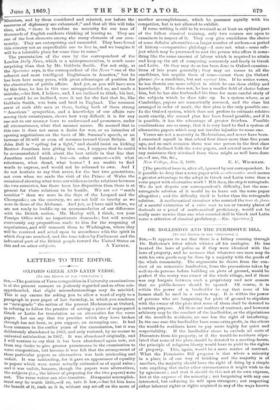LETTERS TO THE EDITOR.
OXFORD GREEK AND LATIN VERSE.
[TO THE EDITOR OF THE " SPECTATOR:]
SIR,—Tbe position of Verse composition in University examinations is at the present moment so jealously regarded and so often misapprehended, that slight misunderstandings may do mischief. This is my excuse for asking you to allow a word of reply to a paragraph in your paper of last Saturday, in which you condemn as "retrograde " the action of the present Moderators at Oxford, in refusing to follow the practice of setting a piece of unprepared Greek or Latin for translation as an alternative for the verse paper. Let me saythat the practice which they have broken through has not been, as you suppose, an unvarying one. It had been common in time earlier years of the examination, but it was deliberately abandoned in 1863, and only restored, by no means to universal satisfaction, in 1867. It was abandoned originally, and I will venture to say that it has been abandoned again now, not from any desire to give greater prominence in the examination to verse composition, but because it was felt that the arrangement of these particular papers as alternatives was both misleading and unfair. It was misleading, for it gave an appearance of equality to papers which were never actually estimated as of equal value; and it was unfair, because, though the papers were alternatives, the subjects (i.e., the labour of preparing for the two papers) were not. The verse writer can also translate. His special accomplishment may be worth little,—if so, rate it low,—but let him have the benefit of it, such as it is, without any set-off on the score of
another accomplishment, which he possesses equally with his competitor, but is not allowed to exhibit.
If verse writing is still to be retained as at least an optional part of the fullest classical training, only two courses are open to examiners in respect of it. They may give candidates the choice of some definite alternative—a larger number of authors—a period of history—comparative philology—I care not what—some subject which may be presumed to cost the person who offers it something like the same amount of labour which is required to attain and keep up the art of composing accurately and freely in Greek and Latin. Or they may do as has been done in Oxford examinations of late years generally ; they may set verses to all the candidates, but require them of none—count them (in Oxford phrase) for a candidate, but not against him. If he writes verses, he has therein one more subject in which he can show ability and knowledge. If he does not, he has a smaller field of choice before him, but ho has also husbanded his time for more careful study of the subjects which he does take up. lu a system where, as at Cambridge, papers are numerically assessed, and time class list arranged in order of merit, the first plan is the only possible one. In the Oxford system, which does not profess to estimate relative merit exactly, the second plan has been found possible, and if it is possible, it has the advantage of greater freedom. Possible combinations are so many, that it is very hard to find a system of alternative papers which may not involve injustice to some ono.
Verses are not a necessity in Moderations, and never have been. I examined myself in that school four times more than five years ago, and on each occasion there was one person in the first class who had declined both the verse papers, and several more who for any assistance they obtained front them might as well have done so.—I am, Sir, &c.,
New College, .Tune 3, 1869. E. C. WICKHAM.
[The practical issue is, after all, ignored by our correspondent. Is it possible to deny that a verse paper with no alternative work means a greater advantage to the adept in Greek and Latin verse than a verse paper with alternative work 7 if it does, the step is retrograde. We do not dispute our correspondent's difficulty, but the nonretrograde solution of it would be to leave out the verse paper altogether ; and the difficulty itself is better than the retrograde solution. A mathematical examiner who counted the tapir de force of a mental extraction of a cube root to ten or twenty places of decimals as a proof of mathematical proficiency, would not be really more unwise than one who counted skill iu Greek and Latin verse a criterion of classical proficiency.—En. Spectator.]






























 Previous page
Previous page